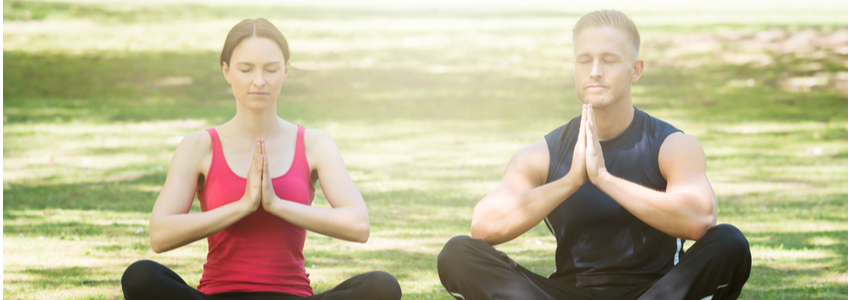Feeling Attacked by Panic or Anxiety? Here Are Some Strategies to Cope
Date 3/31/2025
Explore More:
Anxiety

Strategies for Overcoming Panic and Anxiety
Those who deal with anxiety on a regular basis know that it's much more than just feeling anxious all the time. When you have anxiety, you feel a constant sense of apprehension, engage in compulsive behavior, and even suffer panic attacks. Enduring anxiety can also mean an endless cycle of uneasy and negative thoughts that can be difficult to break.
Anxiety can cripple your confidence and keep you from enjoying your life to the fullest. You may have trouble venturing into new territory, making new friends, or standing up for yourself. If you find yourself suffering from panic attacks or lack self-confidence because your anxiety is so all-consuming, there is help for you.
How Anxiety Affects Your Body
Anxiety is more than just an unhealthy thought pattern. It's also a nervous system issue that can affect your entire body. In fact, anyone who has endured an anxiety attack has likely experienced an increased heart rate, a rush of hormones, and a feeling of tenseness. Here are some signs of anxiety and panic.
Elevated Heart Rate and Blood Pressure
In the short term, episodes of anxiety increase your heart rate and your blood pressure, according to WebMD. Over time, however, chronic anxiety can elevate your risk for cardiovascular disease and heart attacks because of the strain your anxiety puts on this organ.
Stomach Upset, Diarrhea, and Constipation
Anxiety can impact your stomach and digestive system differently depending on how your body reacts to it. Some sufferers of Generalized Anxiety Disorder (GAD) develop chronic diarrhea and stomach cramps, while others experience constipation.
Dry Mouth and Sore Throat
When you feel anxious, your body responds by redirecting fluids into essential organs and tissues. That moisture must come from somewhere --- usually your mouth. That's why an episode of anxiety might make your mouth feel dry and your throat dry or sore. Here's a look at how else anxiety can affect your body.
Sleep Disturbances
You might experience difficulty falling or staying asleep during periods of extreme anxiety. Insomnia leads to generalized fatigue, light-headedness, and other unpleasant symptoms. In the long run, chronic sleeplessness can impact your ability to function during day-to-day activities. Issues other than anxiety can cause insomnia, however, so consult a psychic hotline to explore different possibilities.
Headaches and Concentration Problems
Many of anxiety's physical symptoms influence each other. For example, insomnia and dehydration can cause headaches and difficulty concentrating. Additionally, when your thoughts are focused on situations or eventualities that worry you, those same two symptoms can result.
Hyperhidrosis
Also called excessive sweating, hyperhidrosis is usually temporary in anxiety sufferers. When you feel calmer, the sweating stops. However, during periods of hyperhidrosis, you will dehydrate more easily and may feel uncomfortable.
Dizziness and Weaknesses
When you feel anxious, your muscles tense in preparation for danger. This can lead to dizziness and weakness as well as muscle cramps and soreness. In some cases, dizziness also signals the start of a panic attack.
Hyperventilation
Fast breathing, or hyperventilation, can make you feel as though you aren't able to inhale enough oxygen. This might go together with symptoms like headaches and weakness. Learning breathing techniques can help ease this issue.
Skin and Hair Problems
During periods of high stress and anxiety, your hair might fall out at a faster rate, and you might have dry skin. Dehydration often plays a significant role in these symptoms.
Low Libido
You might experience a decrease in your libido as you battle anxiety. Talking calmly about how you feel with your partner can reduce the potential for hurt feelings and help you address the anxiety and not just your symptoms.

What to Do During a Panic Attack
A moment of intense fear, anxiety, and panic can strike at any moment, leaving you reeling. A panic attack can last anywhere from 5 to 20 minutes. Most panic attacks peak after about 10 minutes, then begin to subside.
Understanding that this feeling of intense anxiety will pass can make it easier to endure, though no less uncomfortable in the moment. Instead of trying to deny what's happening or ignore the symptoms, experts advise that you acknowledge what is happening.
Try these tactics for calming down from a panic attack.
Inhale Lavender
Lavender is proven to help reduce anxiety in a severe panic attack and produce a calming sensation. Keep lavender essential oil handy and breathe in this soothing scent when you feel panic rising.
Change Your Environment
A busy setting can become overwhelming in the midst of a panic attack. When possible, remove yourself. If you can't do this, close your eyes to shut out stressful surroundings.
Focus on One Object
Your mind can start spinning like a top when you're having a panic attack. Choose one object and focus on it until the panic eases. You might keep a special object with you for this purpose, such as a smooth worry stone or a calming amethyst bracelet.
Breathe Deeply
Place your hand just under your ribcage and breathe deeply into your belly so you feel it rise and fall with each breath. Count to five on the inhale and the exhale to keep your breath slow and steady.
Relax Your Muscles
Sit or lie down in a comfortable position and systematically relax your muscles by tensing and releasing them, one group at a time. Begin with your feet, then move progressively up through your body until you're tensing and releasing your neck.
Summon a Soothing Image
Create a mental "happy place" that you can retreat to when you're having a panic attack. Build this image in great detail through peaceful meditation sessions when you're feeling calm, so you know it well. When you feel panicked, summon that image and focus on all the details, like the sound of the ocean waves, the smell of the salt air, and the feel of your toes in damp sand.
When you know what to do in a panic attack, you can keep anxiety and panic from taking over your life, so your fears won't determine the course of your life.

What to Do After a Panic Attack
Once the symptoms have subsided, get yourself to a place where you feel safe and have a self-care plan ready. This could include things like:
-
Drinking a glass of water or a calming tea, such as chamomile
-
Sitting quietly in a place where you won't be disturbed.
-
Talking it out with a close friend, therapist, or trusted advisor
Different types of talk therapy are popular and helpful ways to address your anxieties. Consult with a medical or mental health professional like a psychiatrist or psychologist. Psychologists focus on psychological testing and behavioral intervention. A psychiatrist is a medical doctor who can prescribe medications for anxiety or panic attacks when needed.
If you aren't in any sort of talk therapy treatment, just talking to a friend, family member, or phone psychic about your anxieties and addressing your feelings can help you sort out your thoughts and feelings with some objective help and lead you to feel less stressed.
You can't fight this battle alone. You need people to help you, which is why you should talk to your closest family members and friends about your anxiety. Let them know the situations that make you most uncomfortable and ask them to help you if they see you panicking.

Discover What Causes Your Anxiety
There are reasons for your anxiety. Realizing that is the easy part; pinpointing the cause is harder. You have to figure out your triggers. Does anxiety strike you in larger groups, or when you're talking to your boss? Is there a trigger pattern that you can identify? Pay attention to what's going through your mind at the first sign of symptoms.
Practicing self-awareness can give you a deeper understanding of what sets your anxiety off and what triggers stress for you. As you become more aware of your emotions and your thoughts, you can start to recognize when you need to use a specific technique to best manage your stress and anxiety.
Let Go of Control Issues
Control is sometimes at the root of anxiety. You must realize that there are things you can't control. If you're a good person who is kind to your friends, compassionate with strangers, hard-working, and loving, then you're doing your job. You can't control the weather, your manager's behavior, or other people's reactions to things. Focus on what you can control and let go of everything else.
For longtime anxiety sufferers, one of the most damaging ideas is the persistent idea that they should have better control over their thoughts. In fact, some people try to suppress negative thoughts, only to find that trying to stop them can be more harmful than letting them run their course.

Preventing Future Panic Attacks
Acknowledging the connection between your mind and your body can be a first step toward handling anxiety long-term and preventing future panic attacks. If you struggle with anxiety and panic attacks, try these options for shoring up your defenses.
Practice Diaphragmatic Breathing
Rather than breathing from your chest, practice what's called diaphragmatic breathing. Deep belly breaths, like those done during yoga, have shown to be effective in lowering stress and anxiety. One reason why deep breathing works is that you cannot breathe deeply and be anxious at the same time.
Try the 4-7-8 breath technique: Exhale completely through your mouth, then inhale through your nose for a count of four. Hold your breath for a count of seven. Let the air out slowly through your mouth for a count of eight. Repeat the 4-7-8 breath exercise whenever you're feeling anxious.
Get Moving
Exercise is a great antidote to anxiety in both the immediate moment and in the long term. Exercising regularly improves health and self-esteem, and it keeps you fit. As you exercise, endorphins flood your system creating a positive, euphoric feeling that diminishes your perception of pain.
Yoga is also scientifically proven to bring a sense of calm and reduce anxiety and depression. Incorporate these seven stress relieving yoga poses into your routine and watch the anxiety start to melt away.
Take Walks in Nature
Take a walk in nature if you're feeling especially stressed. Being in nature has amazing benefits for both your mental and physical health, and it can also help boost your mood. Find a park or nature trail where you can take a walk for 20 or 30 minutes. Similarly, you can also make this a part of your regular exercise routine, which can also help you manage your stress.
Take up a Relaxing Hobby
Get involved in a relaxing hobby so you have an outlet during times you feel overwhelmed or anxious. Painting, coloring, weaving, and other activities can help you relax at the end of a hard day and relieve anxiety through the practice of creating something with your hands.
Eat Something Healthy
According to Dr. Ramsey, coauthor of The Happiness Diet, people tend to get more anxious and irritable when they are hungry. Dr. Ramsey recommends a sustaining snack in these situations, such as nuts with water or hot tea.
Food plays a big role in how you feel. If you start making better food choices, your body will respond by making you feel happier. A healthy diet can reduce anxiety in the long term as well. Anxiety can be caused by a number of factors, including a lack of proper nutrition. Vitamins and essential minerals like B6 and iron are important to support a healthy mind and body. Whole grains, eggs, and vegetables are good sources of B6, and beans, nuts, and leafy green vegetables have plenty of iron and a wide variety of phytonutrients to help reduce anxiety.
Try Mindfulness Meditation
Mindfulness meditation was originally a Buddhist practice but is now commonly used as a therapy that is particularly effective in treating anxiety. Mediation is another step in managing your stress and anxiety. Meditation can improve psychological balance and increase calmness and relaxation.
How do you begin practicing mindfulness meditation? The idea is essentially to be mindful and aware of each moment as it occurs, instead of living in the past or being anxious about the future, as Psychic Mylie explains in her podcast, Make Time for Mindfulness. The key to getting started is to try and pay attention to the present moment without judgment and take note of the truth of the present moment as it is taking place.
Try a daily routine of quieting your mind and focusing meditatively on the present for 5 to 10 minutes. In time, you will be able to summon this sense of staying peaceful and present more quickly when you need it.
Psychic Sources offers a library of free guided meditations and podcasts that can help you calm the mind and focus on the present. If you suffer from anxiety, the Anxiety First Aid Podcast by Psychic Rachelle may be particularly helpful.
Get a Pet
Having a pet can provide therapeutic and health benefits, including allaying anxiety and diminishing feelings of depression and loneliness. Having a pet also encourages exercise, which further alleviates stress. Learn more about your pet and the healing properties of being a pet owner by talking to a pet communicator.
Make a List of Everything You're Thankful For
Make a list of everything you're thankful for. Put your gratitude list in a place where you will see it often to keep yourself in a practice of gratitude. This tactic can help you deal with anxiety, too, because it gives you perspective about what things are out of your control and what things you can change.
Incorporate these natural approaches to settling your anxiety into your daily routine to reduce both immediate and long-term anxiety!
Find a Psychic

Comments
ohiogal44: Excellent article !